Garage Door Hinge Types
Your garage door is more than a mere gateway; it serves as a pivotal element that influences the overall appeal, security, and functionality of your home.
Amidst the intricate system that makes up a garage door, one often overlooked but crucial component is the hinge. The hinge is not merely a mechanical joint; it is the linchpin that ensures the seamless operation and enduring durability of garage door.
This article, I embark on a comprehensive journey to explore the diverse world of garage door hinges, examining their types, the materials that make them up, offering valuable installation insights, and uncovering a number of other considerations that are important to the performance of garage door.
Understanding Garage Door Hinges
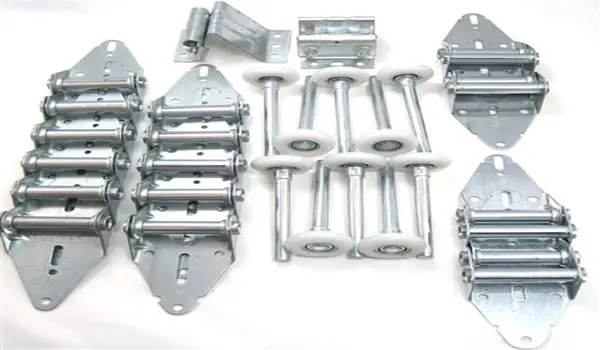
At its core, a garage door hinge is a small but mighty component that enables the door panels to pivot during opening and closing. Whether you have a residential garage or a commercial one, the type of hinge used can significantly impact performance.
Garage door hinge types
Tee hinges
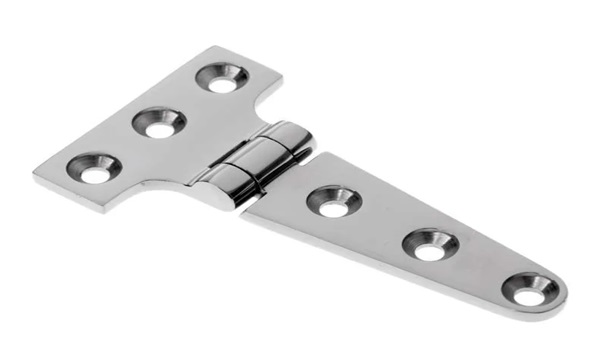
Tee hinges, also known as hook and strap hinges, are a type of hinge commonly used for heavy-duty applications, such as garage doors, shed doors, and gates. They are known for their strength, durability, and ease of installation. Tee hinges are typically made of steel or wrought iron and can be coated with a variety of finishes, such as zinc, black oxide, or paint.
Pros
- Strength and durability: Tee hinges are designed to withstand heavy loads and harsh weather conditions.
- Easy installation: Tee hinges can be easily installed by homeowners using basic tools.
- Versatility: Tee hinges can be used for a variety of applications, including garage doors, shed doors, gates, and barn doors.
- Aesthetics: Tee hinges can add a decorative touch to a garage door or other structure.
Cons
- Cost: Tee hinges are typically more expensive than other types of hinges.
- Appearance: Tee hinges can have a more industrial appearance than other types of hinges.
Applications
Tee hinges are commonly used for the following applications:
- Garage doors: Tee hinges are the most common type of hinge used for residential garage doors. They are strong and durable enough to withstand the weight of a garage door and can be easily installed.
- Shed doors: Tee hinges are also a popular choice for shed doors. They are strong and durable enough to withstand the weight of a shed door and can be easily installed.
- Gates: Tee hinges can be used for a variety of gates, including driveway gates, garden gates, and pool gates. They are strong and durable enough to withstand the weight of a gate and can be easily installed.
- Barn doors: Tee hinges are a popular choice for barn doors. They have a rustic appearance that is well-suited for barn doors and can be easily installed.
Tee hinges are a strong, durable, and versatile type of hinge that is well-suited for a variety of applications. They are easy to install and can add a decorative touch to a garage door or other structure. Tee hinges can be more expensive than other types of hinges and may have a more industrial appearance.
Strap hinges
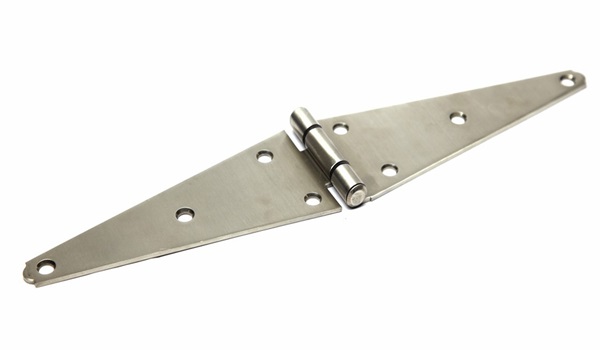
Strap hinges, also known as band hinges, are a type of heavy-duty hinge commonly used for commercial and industrial applications. They are known for their strength, durability, and versatility. Strap hinges are typically made of steel or wrought iron and can be coated with a variety of finishes, such as zinc, black oxide, or paint.
Pros
- Strength and durability: Strap hinges are designed to withstand heavy loads and harsh weather conditions.
- Versatility: Strap hinges can be used for a variety of applications, including commercial and industrial doors, gates, and machinery.
- Aesthetics: Strap hinges can add a decorative touch to a door or other structure.
- Security: Strap hinges can be used to secure doors and gates against forced entry.
Cons
- Cost: Strap hinges are typically more expensive than other types of hinges.
- Appearance: Strap hinges can have a more industrial appearance than other types of hinges.
- Installation: Strap hinges can be more difficult to install than other types of hinges.
Applications
Strap hinges are commonly used for the following applications:
- Commercial and industrial doors: Strap hinges are the most common type of hinge used for commercial and industrial doors. They are strong and durable enough to withstand the weight of a commercial or industrial door and can be easily installed.
- Gates: Strap hinges can be used for a variety of gates, including driveway gates, warehouse gates, and security gates. They are strong and durable enough to withstand the weight of a gate and can be easily installed.
- Machinery: Strap hinges are also used for a variety of machinery applications, such as doors on industrial machinery and equipment. They are strong and durable enough to withstand the weight of the machinery and can be easily installed.
Strap hinges are a strong, durable, and versatile type of hinge that is well-suited for a variety of heavy-duty applications. They can add a decorative touch to a door or other structure and can be used to secure doors and gates against forced entry. Strap hinges can be more expensive than other types of hinges and may have a more industrial appearance. They can also be more difficult to install than other types of hinges.
Band & Gudgeon hinges
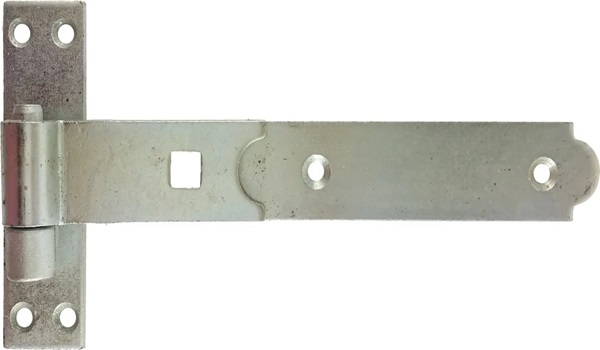
Band & Gudgeon hinges, also known as Hook and Band hinges or Hook and Ride hinges, are a type of heavy-duty hinge commonly used for wooden gates, particularly in agricultural and rural settings. They are known for their strength, durability, and ease of installation. Band & Gudgeon hinges are typically made of wrought iron or steel and are often galvanized or painted to protect them from the elements.
Pros
- Strength and durability: Band & Gudgeon hinges are designed to withstand heavy loads and harsh weather conditions.
- Versatility: Band & Gudgeon hinges can be used for a variety of gate applications, including wooden gates, field gates, and barn doors.
- Ease of installation: Band & Gudgeon hinges are relatively easy to install, even for DIY enthusiasts.
- Aesthetics: Band & Gudgeon hinges have a traditional appearance that can add a decorative touch to a gate or other structure.
Cons
- Cost: Band & Gudgeon hinges can be more expensive than other types of hinges, such as tee hinges or strap hinges.
- Appearance: Band & Gudgeon hinges may not be suitable for modern or contemporary gate designs.
- Security: Band & Gudgeon hinges may not be as secure as other types of hinges, such as those with locks or deadbolts.
Applications
Band & Gudgeon hinges are commonly used for the following applications:
- Wooden gates: Band & Gudgeon hinges are the traditional hinge for wooden gates. They are strong and durable enough to withstand the weight of a wooden gate and can be easily installed.
- Field gates: Band & Gudgeon hinges are also a popular choice for field gates. They are strong and durable enough to withstand the weight of a field gate and can be easily installed.
- Barn doors: Band & Gudgeon hinges can be used for barn doors, particularly in rustic or traditional settings. They have a decorative appearance that is well-suited for barn doors and can be easily installed.
Band & Gudgeon hinges are a strong, durable, and versatile type of hinge that is well-suited for a variety of gate applications, particularly for wooden gates in agricultural and rural settings. They are easy to install and can add a decorative touch to a gate or other structure.
Band & Gudgeon hinges can be more expensive than other types of hinges and may not be as suitable for modern or contemporary gate designs. They may also not be as secure as other types of hinges, such as those with locks or deadbolts.
Adjustable hinges
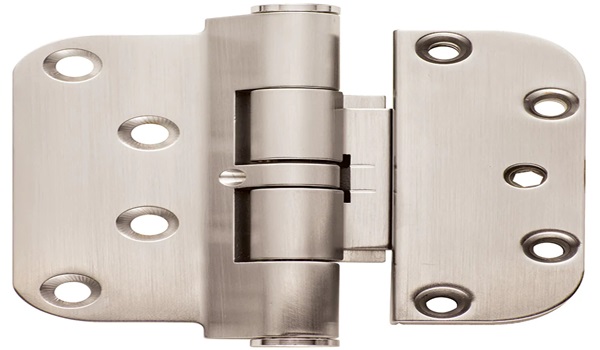
Adjustable hinges are a type of hinge that allows for fine-tuning of the alignment and positioning of a door or other object. They are commonly used in applications where precise alignment is critical, such as garage doors, cabinets, and machinery. Adjustable hinges typically have a mechanism that allows for adjustment in one or more directions, such as vertically, horizontally, or laterally.
Pros
- Versatility: Adjustable hinges can be used for a wide variety of applications, including garage doors, cabinets, machinery, and furniture.
- Precision: Adjustable hinges allow for fine-tuning of alignment, ensuring that doors and other objects are properly positioned and function smoothly.
- Ease of installation: Adjustable hinges are typically easy to install and can be adjusted without removing the door or object.
- Durability: Adjustable hinges are typically made from durable materials that can withstand wear and tear.
Cons
- Cost: Adjustable hinges are typically more expensive than standard hinges.
- Complexity: Adjustable hinges can be more complex to install than standard hinges, and may require additional skills or tools.
- Visibility: Adjustable hinges may be more visible than standard hinges, and may not be as aesthetically pleasing in some applications.
Applications
Adjustable hinges are commonly used for the following applications:
- Garage doors: Adjustable hinges are often used on garage doors to ensure that the door is properly aligned with the frame and seals properly.
- Cabinets: Adjustable hinges are used on cabinets to ensure that the doors are properly aligned and open and close smoothly.
- Machinery: Adjustable hinges are used on machinery to ensure that the components are properly aligned and function smoothly.
- Furniture: Adjustable hinges are used on furniture to ensure that the doors and drawers are properly aligned and open and close smoothly.
Adjustable hinges are a versatile and valuable tool for applications where precise alignment is critical. They can help to ensure that doors and other objects are properly positioned and function smoothly. Adjustable hinges can be more expensive than standard hinges, and may require additional skills or tools to install.
Reversible hinges
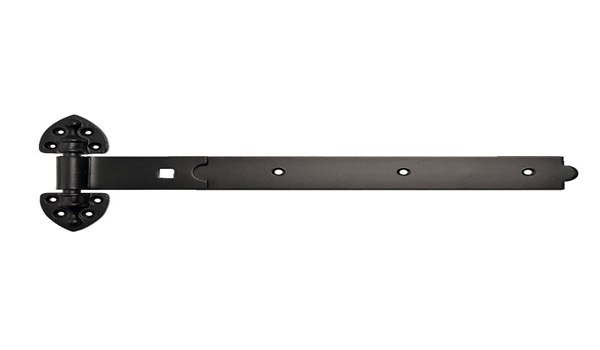
Reversible hinges, also known as “universal” hinges, are a type of hinge that can be mounted on either the left or right side of a door or panel. This makes them a versatile option for a variety of applications, such as doors, gates, and furniture. Reversible hinges are typically made of steel, brass, or stainless steel and can be coated with a variety of finishes, such as zinc, black oxide, or paint.
Pros
- Versatility: Reversible hinges can be mounted on either the left or right side of a door or panel, making them a versatile option for a variety of applications.
- Ease of installation: Reversible hinges are typically easy to install, even for DIY enthusiasts.
- Cost-effectiveness: Reversible hinges are often more cost-effective than other types of hinges, such as tee hinges or strap hinges.
- Aesthetics: Reversible hinges can come in a variety of finishes to match your décor.
Cons
- Strength: Reversible hinges may not be as strong as other types of hinges, such as tee hinges or strap hinges.
- Durability: Reversible hinges may not be as durable as other types of hinges, such as tee hinges or strap hinges, and may not be suitable for heavy-duty applications.
- Appearance: Reversible hinges may not have the same aesthetic appeal as other types of hinges, such as band & gudgeon hinges.
Applications
Reversible hinges are commonly used for the following applications:
- Interior doors: Reversible hinges are a popular choice for interior doors, as they can be easily installed on either side of the door.
- Cabinet doors: Reversible hinges are also commonly used on cabinet doors, as they allow for a variety of mounting options.
- Furniture: Reversible hinges can be used on a variety of furniture pieces, such as chests, cabinets, and desks.
- Gates: Reversible hinges can be used on lightweight gates, such as garden gates or shed gates.
Reversible hinges are a versatile, easy-to-install, and cost-effective option for a variety of applications. They are a good choice for interior doors, cabinet doors, furniture, and lightweight gates. Reversible hinges may not be as strong or durable as other types of hinges, and they may not have the same aesthetic appeal as other types of hinges.
Average Prices for Garage Door Hinges
Tee Hinges: $5-$15 per Hinge
Tee hinges, known for their simplicity, are often the most budget-friendly option. Ranging from $5 to $15 per hinge, they provide a cost-effective solution for residential garage doors.
Strap Hinges: $10-$25 per Hinge
Strap hinges, offering a blend of style and strength, fall in the mid-range of pricing. With an average cost of $10 to $25 per hinge, they cater to homeowners seeking both functionality and visual appeal.
Band & Gudgeon Hinges: $15-$30 per Hinge
Band & Gudgeon hinges, known for their robust design, come at a higher price point. Ranging from $15 to $30 per hinge, they are suitable for those prioritizing durability in heavy-duty applications.
Adjustable Hinges: $20-$50 per Hinge
Adjustable hinges, providing flexibility in installation, are positioned in the higher price range. With an average cost of $20 to $50 per hinge, they cater to those seeking versatility in their garage door setup.
Reversible Hinges: $5-$10 per Hinge
Reversible hinges, often more straightforward in design, are among the more affordable options. Priced between $5 and $10 per hinge, they offer a cost-effective choice for homeowners on a budget.
Please note that these are average prices, and the actual costs may vary based on the retailer, location, and specific product features.
Choosing the Right Size for Field Gate Hinges
Selecting the appropriate size for your field gate hinges is crucial for ensuring the proper functionality and longevity of your gate. The size requirement is directly influenced by the dimensions and weight of the gate.
Here’s a handy guideline to assist you in making the right choice:
Gates up to 4 Feet Wide: Use 3-Inch Hinges
For smaller gates, those spanning up to 4 feet in width, opt for 3-inch hinges. These provide ample support while maintaining proportionality for the gate’s size.
Gates 4 to 6 Feet Wide: Use 4-Inch Hinges
In the case of moderately sized gates ranging from 4 to 6 feet in width, upgrading to 4-inch hinges is advisable. This step ensures enhanced stability and support.
Gates 6 to 8 Feet Wide: Use 5-Inch Hinges
For larger gates, spanning 6 to 8 feet, the use of 5-inch hinges becomes necessary. The increased size accommodates the additional weight and dimensions, maintaining the integrity of the gate.
Gates Over 8 Feet Wide: Use 6-Inch Hinges
Gates exceeding 8 feet in width require the robust support of 6-inch hinges. These heavy-duty hinges are designed to manage the substantial weight and provide the necessary structural stability.
It’s important to note that the frequency of gate usage and the local weather conditions should also be taken into consideration. Gates subjected to frequent use or located in high-wind areas may benefit from heavier-duty hinges.
Additional Tips for Choosing Field Gate Hinges:
1. Durable Material Matters:
Opt for hinges made from durable materials such as galvanized steel or wrought iron. These materials offer resistance to corrosion and ensure the longevity of the hinges, especially when exposed to the elements.
2. Size Compatibility:
Ensure that the chosen hinges are the right size for your gate. An ill-fitting hinge can compromise the overall stability and security of the gate.
3. Weight Distribution:
Use a sufficient number of hinges to support the weight of your gate adequately. Distributing the load evenly among the hinges contributes to smooth operation and minimizes stress on individual components.
4. Correct Installation Is Key:
Install the hinges correctly to guarantee proper alignment and security. Following the manufacturer’s guidelines for installation ensures that the hinges function optimally.
Safety Measures Related to Garage Door Hinges
Garage doors can pose safety risks, especially during installation or maintenance. To ensure a safe environment, follow these precautions:
- Use Protective Gear: Wear safety glasses and gloves during installation or maintenance to protect against injuries.
- Disconnect Power: If your garage door has an automatic opener, disconnect the power before working on the hinges.
- Seek Professional Help: If you’re unsure or uncomfortable with the installation or maintenance process, don’t hesitate to seek professional assistance.
Garage Door Hinges and Home Security
Beyond their functional role, garage door hinges contribute to home security. Choosing hinges with security features can enhance the overall safety of your home. Look for hinges with anti-tamper mechanisms and durable materials to deter potential intruders.
Innovations in Garage Door Hinge Technology
As technology continues to advance, garage door hinges have seen innovations to improve their performance. Some of the recent advancements include:
- Smart Hinges: Hinges with built-in sensors and connectivity for remote monitoring and control.
- Self-Lubricating Hinges: Hinges designed to automatically lubricate moving parts, reducing the need for manual maintenance.
Common Issues with Garage Door Hinges
Even with proper maintenance, garage door hinges can experience issues over time. Identifying and addressing these problems promptly can prevent further damage. Common issues include:
- Squeaking or Grinding Noises: Indicative of friction or lack of lubrication.
- Loose Hinges: Can affect the alignment and stability of the door.
- Rust and Corrosion: Especially common in humid or coastal areas.
Customer Reviews and Recommendations
Before making a decision on garage door hinges, it’s beneficial to explore customer reviews and recommendations. Online platforms and forums often provide insights into the performance, durability, and overall satisfaction of specific hinge types and brands. Seek recommendations from friends, family, or professionals in the industry.
Conclusion
The proper selection of field gate hinges is a pivotal aspect of ensuring the stability, functionality, and durability of your gate. As we’ve explored, the size of the hinges is directly correlated with the dimensions and weight of the gate. Following the recommended guidelines for hinge sizes based on gate width is essential for optimal performance.
Starting with 3-inch hinges for smaller gates and progressing to heavy-duty 6-inch hinges for wider entrances, this practical guide offers a straightforward approach to matching hinge size with gate specifications. It’s a strategic consideration that not only enhances the gate’s structural integrity but also contributes to smooth operation over time.
Beyond size, additional factors such as the durability of materials, frequency of use, and weather conditions play crucial roles in the longevity of the hinges and, consequently, the gate itself. Opting for durable materials like galvanized steel or wrought iron ensures resistance to corrosion, prolonging the life of the hinges.
Remembering to install the hinges correctly is equally important. Proper alignment and secure installation, following manufacturer guidelines, guarantee that the hinges perform their role effectively, providing the necessary support to the gate.


